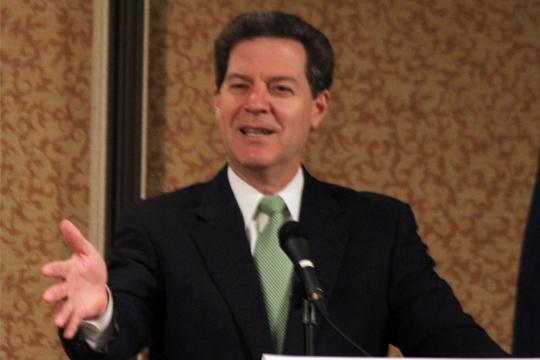Brownback signs school finance bill
April 23, 2014
Governor Sam Brownback signed the school finance bill HB 2506 Monday, which will redistribute an additional $129 million to school districts but also ends mandatory due process hearings for experienced teachers.
The bill was intended to address the Kansas Supreme Court mandate to address funding inequities in schools districts before July 1. The bill, however, included additional provisions that were separate from funding actions; the elimination of the due process hearings being the most controversial.
“The importance of due process is being respectful of the professional position that teachers hold in our society. If you look at any other profession like law and medicine, those two professions have due process,” said Donna LaLonde, interim chair of education at Washburn.
Under the current model, a teacher can be fired in their first three years or not have their contracts renewed without cause. After those years, a teacher receives non-probationary status, meaning that districts who want to fire a teacher must give a reason. In place since 1957, the ability of due process hearings grants teachers to request a proper hearing.
“They have to have a real concrete case against the teacher. They have to have evidence. They have to have mediations with the teacher before they are released,” said Molly Rondeau, senior elementary education major.
A concern for the legislature is that due process allows bad teachers to stay in the system without repercussion. The inability to fire teachers was seen as a barrier to quality education. Rondeau states that the situation is a mixed bag.
“I feel like it is detrimental to have teachers who have been teaching 30 or 40 years who are uninterested and unwilling to learn new techniques,” said Rondeau. “I can also see how it is dangerous to teachers. It comes down to the administration and you have to trust that administrators do the right thing.”
Tracie Lutz, literacy instructor for Washburn and a teacher since 1989, states that there are two sides to the same coin.
“I’m split on the decision,” said Lutz. “On the admnistrative side, I see the difficulty of running through red tape and all the steps the admnistration has to go through.”
Lutz, however, has the same opinion with the Kansas National Education Association about the loss of advocacy rights. In an official press release by the Kansas National Education Association, they addressed their concern of adequately advocating for the needs of children without fear of retribution.
They cited the teachers who have students with needs that are costly, like those with autism, dyslexia or severe physical or emotional exceptionalities. Their concern was that teachers would be pressured to minimize the need for services.
“The biggest question is what is best for the kids?” said Lutz.
KNEA also contends that the only redress by teachers who have been wrongly fired is to combat it with civil litigation. KNEA believes that the costly litigation hearings forces school districts to spend time and money to go to court and far outweigh the negative parts of due process.
LaLonde states that despite the inability to adequately redress issues, this will not completely turn teachers away from teaching in Kansas.
“Teachers are marvelous people. They have such a commitment to helping children that they rarely think of themselves first. I suspect that for most teachers that will continue to be their primary motivation,” said LaLonde.



